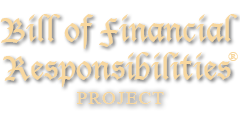CONSTITUTIONAL REFERENCES TO MONEY


Article I
Section 7: All bills for raising revenue shall originate in The House of Representatives.
Section 8: The Congress shall have the power…
- To lay and collect taxes, duties, imposts and excises (and) to pay the debts.
- To borrow money on the credit of the United States.
- To coin money regulate the value thereof, and of foreign coin.
- To provide for the Punishment of counterfeiting the Securities and current Coin of The United States.
- To raise and support Armies, but no Appropriation of Money to that Use shall be for a longer Term than two Years;
Section 9: No capitation or other direct tax shall be laid unless in proportion to the Census.
- No tax or duty shall be laid on articles exported from any state.
- No Money shall be drawn from the Treasury, but in Consequence of Appropriations made by Law; and a regular Statement and Account of the Receipts and Expenditures of all public Money shall be published from time to time.”
Section 10: No State shall…coin Money; emit Bills of Credit; make any Thing but gold and silver Coin a Tender in Payment of Debts; the net Produce of all Duties and Imposts, laid by any State on Imports or Exports, shall be for the Use of the Treasury of the United States;
Article XI
All debts contracted and engagements entered into before the adoption of this Constitution shall be valid against the United States.
Amendment XIV
Section 4: The validity of the public debt of the United States authorized by law including debts incurred for payment of pensions and bounties for services in suppressing insurrection or rebellion shall not be questioned.
Amendment XVI
The Congress shall have the power to lay and collect taxes on incomes from whatever source derived without apportionment among the several states and without regard to any census or enumeration.



